The term “Comfort Zone” has been put to use in professional citations since the 1991 work “Danger in the comfort zone”. It became widely popular after the paper “From Comfort Zone to Performance Management” by Alasdair White in 2008. “Comfort zone” is to be understood as a behavioral state from which an individual operates or works or carries on his way of life. Comfort zone is almost unique to everyone, and it may or may not be equivalent to another individual.
In our life, we do come out of our comfort zones many times, though we rarely recognize it. Your first day at school, moving from school to college, college to your first job, making your next big career move, etc. could be stated as examples.
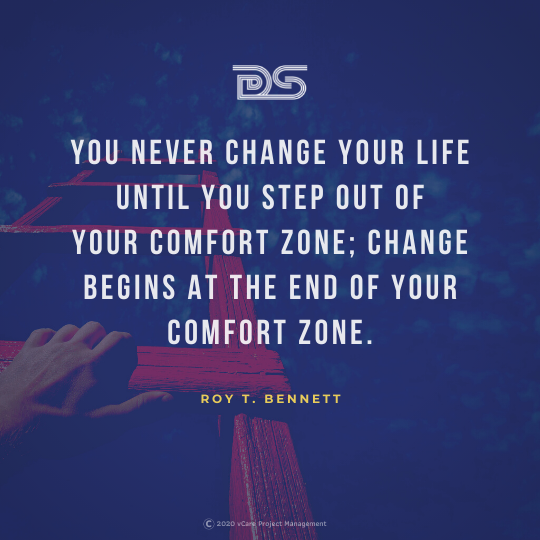
Comfort Zone
At these points in time, we would have experienced a lot of pressure to adapt, expand our skills and continue to learn and evolve. Our inner ego would have pushed us to get out of being labelled as incompetent, inauthentic or an imposter and succeed in the new role assigned to us by time.
It’s also critical to understand first the opportunities this journey out of your comfort zone would reward you. Here we discuss some ways using which we can navigate ourselves out of our comfort zones to achieve success.
Indicators of you being in a comfort zone
Let’s take a case where you have been working as a manager in a reputed organization, handling specific operations, and you are awesome at what you do. If you have specific career goals, and you have identified your destination, you need to understand whether you are currently in a comfort zone first.
Some indicators could be,
- You are doing your job with ease and make consistent paychecks
- You don’t have anybody to benchmark within the organization or the industry forum
- You are pretty much self-sustained, and you don’t see yourself any scope for further growth
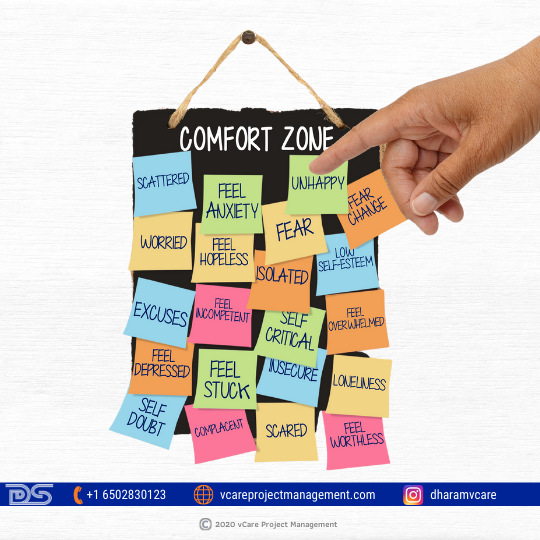
Being in a comfort zone
Comfort zone Assessment Questions
Here are some questions which can help you understand if you are already in the comfort zone.
- When was the last time you were very stressed in making some decisions at work?
- When did you last take up a new challenge?
- When did you do something creative and new?
- Are you happy with what you are doing?
- Are you sure that you are not lost nor out of control?
Why do we need to move out of the Comfort Zone?
When we are in the comfort zone, we don’t learn; we don’t evolve. Learning gets halted, and we fail to embrace new ideas and concepts. We stop experiencing newer things in life, and this might result in loss of acquiring critical behavior or skills. We naturally become the victim of behavior patterns which we are used to as the time spent on comfort zone becomes longer.
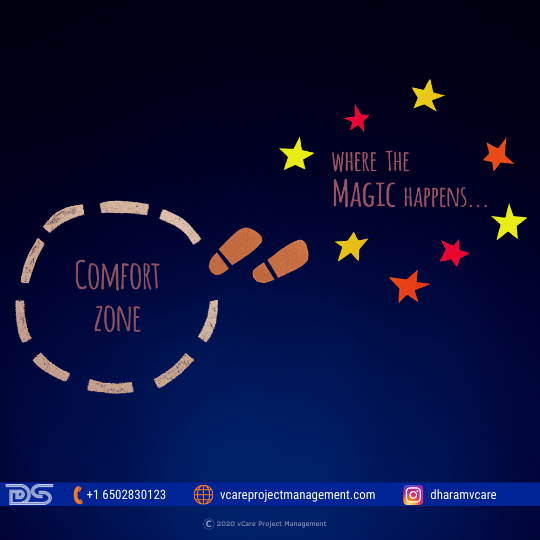
Why do we need to move out of the Comfort Zone?
Gone are the days where living in such a context is not a life challenging issue for an individual. Times have changed, and in today’s professional world, only those who embrace continuous learning and adaptability are better poised to succeed.
Understanding the Fear zone
For any individual contributor of a team, the moment you feel that you have the capability coupled with an excellent opportunity to be part of leadership or management, your journey out of your comfort zone has begun.
When you think about doing something new, you naturally get fear, or you feel terrified. When this thing happens, most of us cloak ourselves with any of these following excuses:
- Yeah, I’m doing what I know very well, and there is nothing wrong about it.
- Why do we need to change the status when everything is going fine today?
- Having a false impression that you have future proof skills because you are thriving today.
- I have maneuvered myself this far, why do I need to propel my limits further.
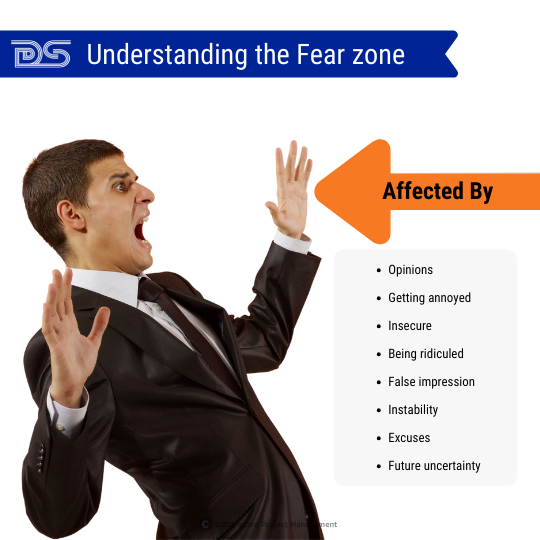
Understanding the Fear zone
When we are in the fear zone, we also tend to be affected by other opinions and get annoyed. Typically, in projects, some people can be identified in a peculiar way wherein they will not share any information due to insecurity or fear. They always worry about what is going to happen.
These are individuals who build a shell around themselves thinking what will others think If I ask this question, maybe people will laugh at me, ridicule me, etc. These are good signs indicating you are in the fear zone.
What is needed to come out of the fear zone?
- Courage
- Compassion
- Wisdom
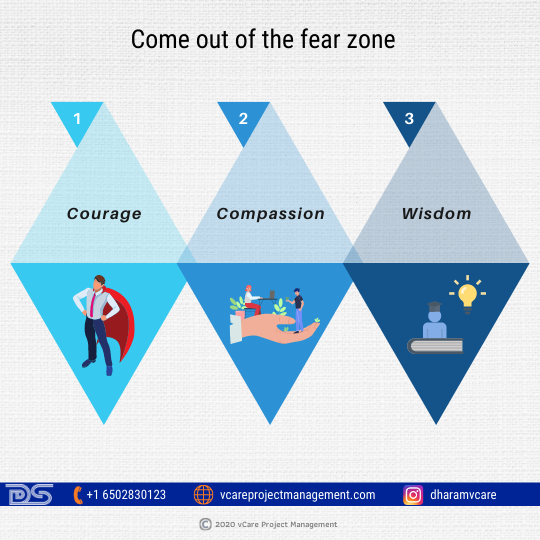
Come out of the fear zone
Have the courage to understand and look situation like “You are not alone” in this. Look at the situations more positively. Consume information which is more reliable and that which will lead you the right direction. Trust yourself first, and also others around you. Get around with people who are your well-wishers and find them within the project organization. Discuss your fears openly with them take baby steps to come out of it. Believe that when you confront your fears, you will also be able to help others confront the fear and manage it better for the overall good of the organization. It might take longer than you think to come out of it, but it is alright. You will be able to maneuver out of the fear zone and move towards reaching your full potential by getting transformed at the Learning Zone.
Most individuals tend to get stuck in this zone or go back to their comfort zone. You must stay in the course of advancing into the subsequent zone. The journey is more rewarding than the end goal of getting beyond the growth zone. Now let’s look at the learning zone.
Learning Zone: Knowing vs Doing Gap
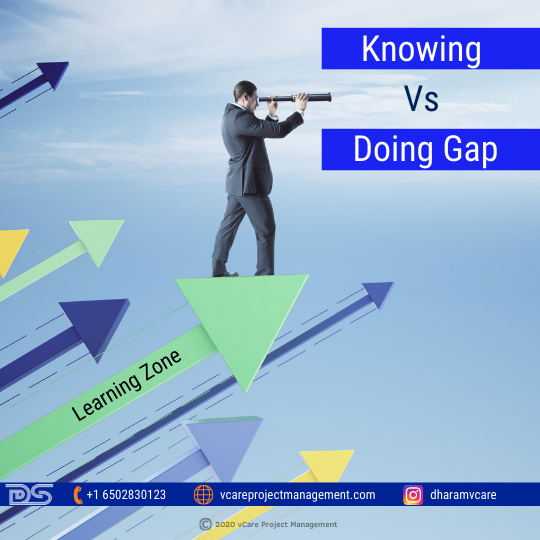
Learning Zone
You are managing a project in India; you have a multi-cultural and a multi-lingual environment. Such a context could position you to get out of the comfort zone to interact, manage these stakeholders.
You, an expert in process manufacturing, is assigned to work on a new project where you are dealing with discrete manufacturing. Here you will have the pressure of handling something new which you haven’t done before.
Given these kinds of situations, project managers tend to look at various resources in terms of books, YouTube videos, courses and prepare themselves. Yet, they will have the anxiety as there is a Knowing-Doing gap. In this case, the learning ought to get transformed as behavior.
Dr Andy Molinsky is a professor at Brandeis University’s International Business School and author of “Reach: A New Strategy to Help You Step Outside Your Comfort Zone, Rise to the Challenge and Build Confidence” recommends 3Cs for the same they are:
- Conviction
- Customization
- Clarity
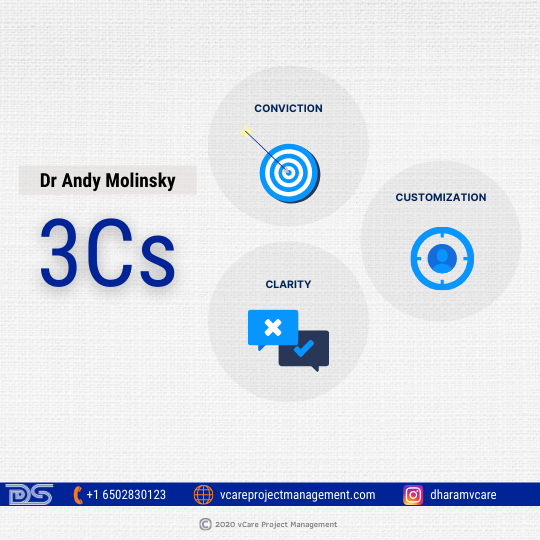
3Cs
Conviction is more towards understanding the deep sense of purpose which can come from the activities which can help your self-esteem or when you have the intent of helping or enabling others. For example, you have a challenge in your project to work on a Gantt Chart, which is essential to be presented to the management. You find that no one else in the team knows about it. Now you need to have the conviction to build it yourself first time as you want to enable the team to help them understand the project situation better. That intent helps you to get you the transformation required. This way, you have responded to the challenge, and also acquired a new skill in the process.
Customization is more of tweaking the solution in your way. Every project organization or PMOs could be different. What worked in your previous office might not work here, as people have cultural and behavior differences. You must customize the data, context, terminology, presentation to their needs by taking steps completely new compared to what you have done in the past. Being adaptive is the most beautiful thing people always admire.
Clarity serves the situation where it is very distorted and chaos. Especially in Project/Program/Portfolio management, where pressing priorities of activities create a nightmare for the managers and resources become contentious. Step away for a short while to take stock of the situation, put yourselves in other person shoes, Self-reflect upon the situation in the right context. Many times, reaching out to a coach or mentor would help in the situation.
Keep building your resilience by doing good things which you are not comfortable. Some simple examples could be Saying “Hello” to strangers, ordering food other than your routine. These acts could increase your will power and mental attitude. By doing these, you can make learning zone your comfort zone and start advancing into the growth zone. Consistently focusing on moving out of the comfort zone is the key.
Growth Zone
Instead of thinking “What if I’m not good enough?”, thinking more like “What if I’m good enough and moving towards success?” would help to be in the growth zone.
Instead of worrying and being stranded at the learning zone, identify the gap in terms of training, upskilling needs, mentoring, coaching needs that navigate towards your objectives. For example, if you are lacking in risk management or project management and need guidance, reach out to the right consultants or coaches or mentors who can help you succeed.
Eradicate the habitual negative thinking and internal fears. With the help of knowledge that you acquired in your learning zone; you should be able to manage things in the growth zone easily. Always ask “What’s the best, most productive action I can take to get the best possible outcome given the situation?”. Change your environment to be positive, have positivity anchors and use visualization techniques. By changing the internal representation of the problem, your ability to recover from that is increased manifold. As a project manager, there are a lot of dependencies and constraints you ought to manage; these dependencies and constraints need to be overcome to eliminate the fear of failure.
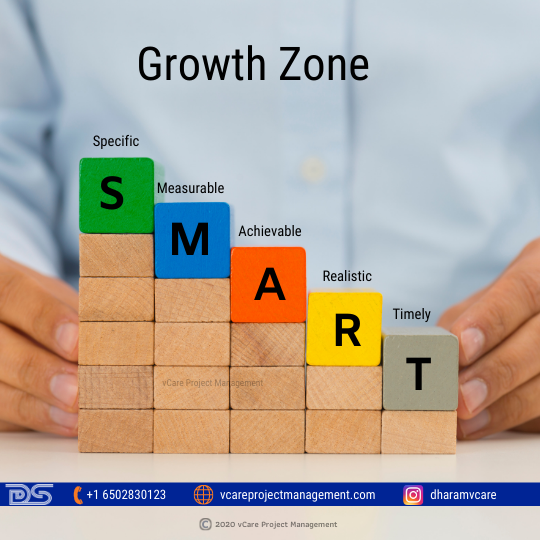
Growth Zone
Typically, negative experiences are what creates fear within. If you believe and value whatever you are doing, you will find a way. You will begin to see them as challenges as opposed to problems or obstacles. Make your goals SMART and start recording your smaller achievements in a book which you can use to track and repeatedly revisit to gain motivation. By eliminating needless fears and factors that hamper your progress, you can break out and live a life beyond limits!
PgMP® / PfMP® certifications
For most senior professionals in the project-program-portfolio management community, there has been no bigger phobia than the PgMP® / PfMP® certification exams. Over the past few years, an aura of unconquerability has been associated surrounding these certifications, but nothing can be far from the actual truth. With proper guidance supported by a well laid out action plan, followed by commitment and hard work, these certifications are achievable, and many of my students are witnesses to the fact. Let us look at the recent stats, concerning these two certifications to understand how exactly this community has managed to thrive irrespective of the current context.
Between 1st July 2020 and 1st Sept 2020, 60 professionals successfully attained their PgMP®, of which 12 are my students. Congratulations to all 60 of them for continuing to have the inner drive to succeed in these tough times.
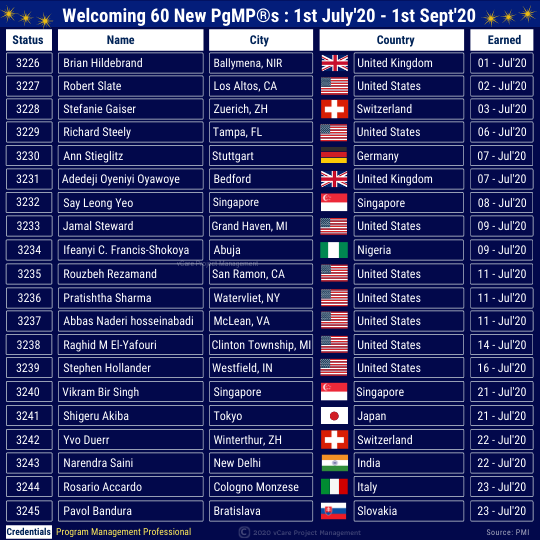
Welcoming 60 New PgMP®s
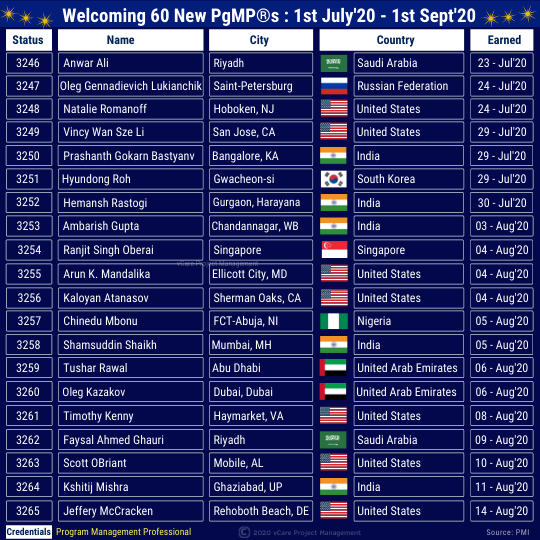
Welcoming 60 New PgMP®s
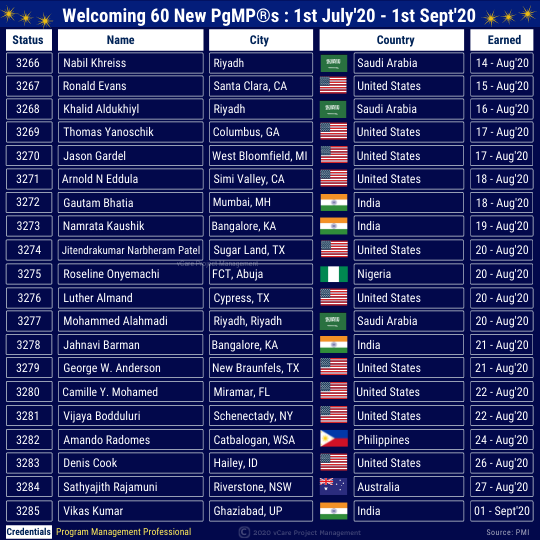
Welcoming 60 New PgMP®s
Regarding PgMP®, as on 1st Sept 2020, vCare has contributed to the success of 289 global PgMP®s (out of 3,286) from 43 countries.
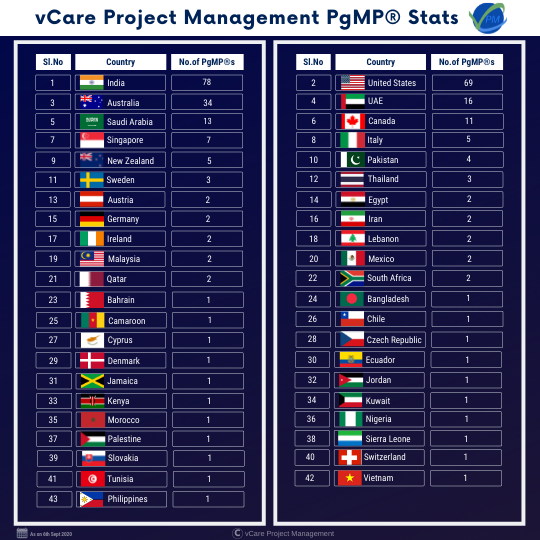
vCare Project Management PgMP® Stats
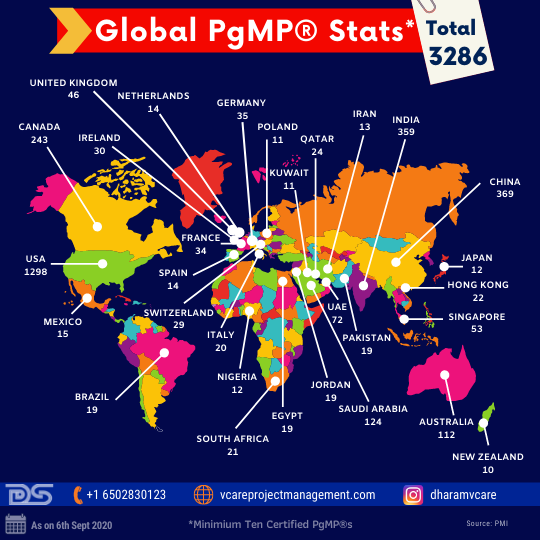
Global PgMP® Stats
Between 1st July 2020 and 1st Sept 2020, 27 professionals successfully attained their PfMP®, of which 2 are my students.
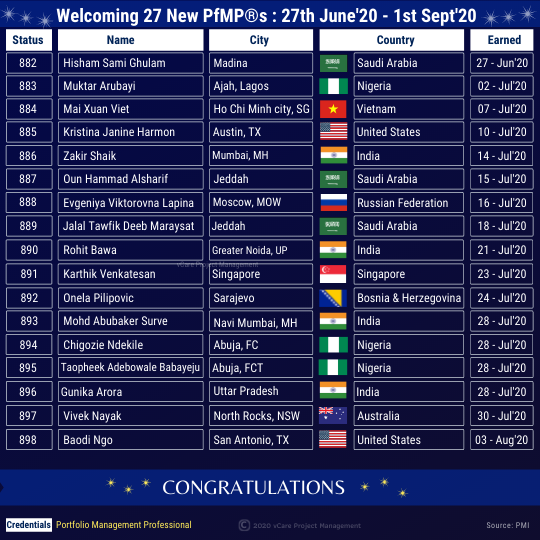
Welcoming 27 New PfMP®s
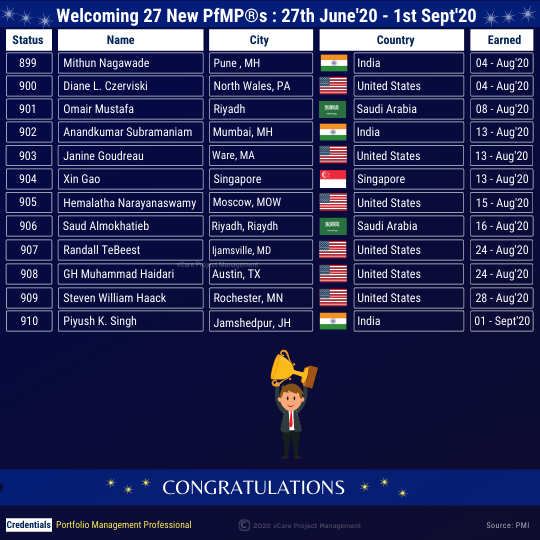
Welcoming 27 New PfMP®s
As on 1st Sept 2020, Global PfMP® count is 911, with 41 of them (5%) with a successful pass rate of 100% being aided by our services.
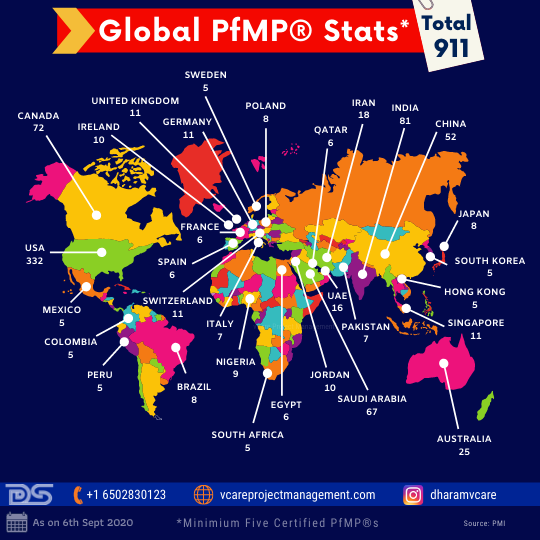
Global PfMP® Stats
Special thanks to the 14 students for entrusting me with their PgMP® / PfMP® certification journey.
1. Vikas Kumar 2. Gautam Bhatia 3. Jason Gardel 4. Faysal Ghauri
5. Tushar Rawal 6. Oleg Kazalov 7. Kalo Atanasov 8. Ranjit Oberai
9. Ambarish Gupta 10. Hemansh Rastogi 11. Vincy Li 12. Natalie Romanoff
13. Omair Mustafa 14. Hisham Sami Ghulam
Even as this pandemic crisis is still rolling out and impacting our economy and jobs, many professionals have elected to emerge out of their comfort zones and work towards pursuing their learning/certification goals. For us, as a leading training provider, the challenge was to customize and optimize our training delivery to meet the online learning requirements that time has thrust on us. What we saw as a challenge and a difficult mountain to climb initially, later turned out to be a smooth journey filled with more advantageous in terms of course delivery, benefiting both the trainers and students on many fronts. Whoever is taking advantage of this lean period to lunge forward are already starting to see benefits with their professional life.
My opinion is that 95% of people stay in their comfort zone. Around 3% people take steps to walk in the fear zone and stay there or come back to comfort zone. 1.5% people stay in the learning zone, and some of them come back to Fear Zone or even Comfort Zone. 0.49% people reach to the Growth Zone, some come back to the lower zones. Less than 0.01% of people go above or stretch beyond the Growth Zone and do wonders. They never return to the lower zone as they move with the escape velocity. Do come out of your comfort zone; the sky is your limit. For those already in the sky, space is your limit. Trust me; you will live a life beyond your dreams. Between, no one is born with skills and attitude, which will take you all the way. More you look inside it will assist you to look beyond the invisible boundaries.
For those of you in the project management space, who wish to get help in navigating out of your comfort zone and achieve PgMP® / PfMP® certifications, consider signing up for our online programs. We will guide you through all the facets of the PgMP® / PfMP® certification journey. Taking into consideration the hardships that companies and professionals are going through currently, we are offering multiple discounts and flexible payment options to these programs. These programs are conducted over customized timings across different time zones to cater to the requests of the students. Given below are the various online programs’ links. Kindly share this information with anyone who you believe might benefit from it.
PgMP®: http://bit.ly/2oBKQXQ
PfMP®: http://bit.ly/39jOZSf
PMP®: https://bit.ly/2BU0mFp
E-Learning: http://bit.ly/3b2HOid
For any questions related to Project Management career, training and certifications, you can book an obligation free 15 minutes session with me by visiting talktodharam.com
PgMP4U is an online mobile application that helps one prepare for the PgMP® exam on the go. Our app gives the essential support required for cracking the PgMP® exam.
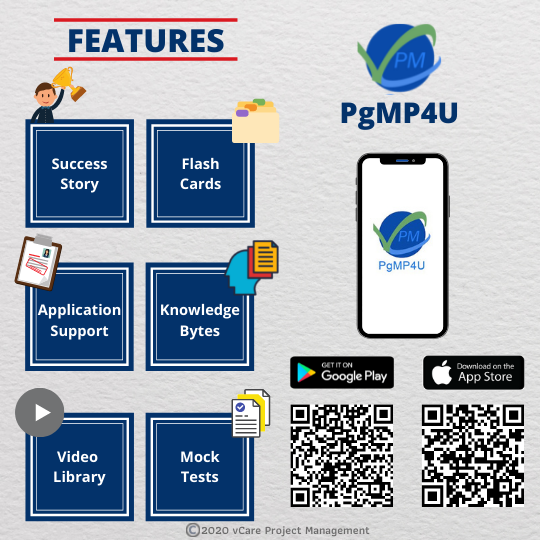
PgMP4U
PgMP4U LinkedIn Group: http://bit.ly/2SBPwIp
PfMP4U LinkedIn Group: http://bit.ly/31P7GKR
Subscribe to vCare Project Management YouTube Channel to view our PgMP® and PfMP® Success Stories: https://bit.ly/2YF0wJl
Subscribe and follow my Podcasts and interviews with Project Management Experts on YouTube at https://bit.ly/2NDY8wd
“Working together for success.”

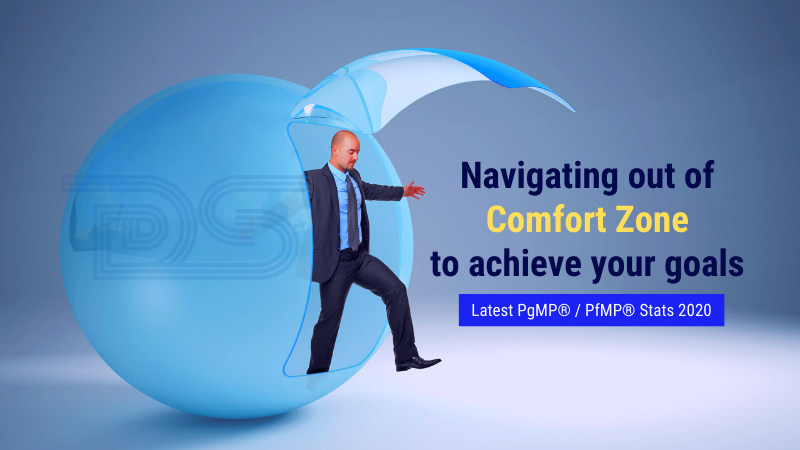
Recent Comments